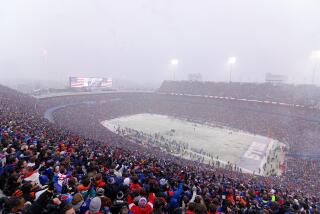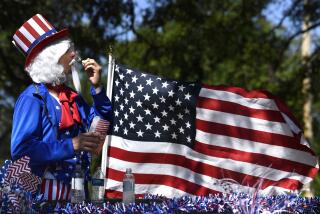Fun Can Be Spoiled in a Flash : Weather: The Midwest in particular has a history of sporting events competing with lightning.
- Share via
As rain poured and lightning crackled, officials in Columbus, Ohio, chose discretion over valor Saturday, halting the USC-Ohio State football game with 2:36 to play. They declared USC a 35-26 winner and broke ground in the process.
Or did they?
History is more dutiful about recording events that have endured the elements to a regulation conclusion, but the Midwest has shown a weather-consciousness in decisions that no final score is as important as safety.
Take the Akron-Youngstown State game Saturday night. It was delayed 71 minutes by a lightning storm, after which Youngstown beat the Zips, 28-23.
Or the final College All-Star game in Chicago, July 25, 1976. For 43 years, the game had featured the best of college football’s seniors being drubbed--with few exceptions--by the reigning National Football League champions. But pro football’s coaches were growing increasingly resentful about time lost in training camp by top draft choices who were gathered for an exhibition.
So, this would be the last such all-star game, on a Friday night with the usual national television audience looking on.
And it rained. And rained, more than a half-inch in 10 minutes. Wind gusted to 63 m.p.h. And, more important, lightning streaked across the sky above Soldier Field at Chicago’s Lakefront.
“I’ve seen rain come down this hard before, but not with so much wind and lightning,” said Mean Joe Greene, now a Steeler assistant coach, but then the cornerstone of Pittsburgh’s Steel Curtain defense. “Most people would be looking for shelter.”
About 4,000 weren’t, instead frolicking, many bare-chested, on the Astroturf after officials halted the game with 1:22 to play in the third quarter and the Steelers holding a 24-0 lead.
They were a hardy, or perhaps foolhardy lot, dismantling the metal goal posts and holding them skyward, toward the flashes of lightning. Their memories were short. Only 13 months before, in neighboring Oak Brook, Ill., an event occurred that perhaps made all athletic officials more cognizant of the possibilities of real disaster when a gathering is introduced to the occasional violence of nature.
At Butler National Golf Course, the Western Open was being played, as it had been since 1899. On Friday, as the second round was being played, it rained, and the rain was preceded by lightning. A bolt hit a group made up of golfers Lee Trevino, Jerry Heard and Bobby Nichols. All were hospitalized, Trevino most seriously. Heard came back the next day to play, but it was years before Trevino’s game was sound again.
The key is lightning. Rain and sleet poured on the Boston College-Alabama football game in Foxboro, Mass., on Nov. 25, 1983, and a partial outage reduced field lighting to half-power for a Friday night game. Still, there was enough light for television, and the teams played on, in the most miserable conditions imaginable--but without lightning.
Some old grads in Columbus on Saturday probably belittled their grandchildren’s scurrying for cover as the rain fell. They can remember a November day in 1950, when, with a foot of snow on the ground, temperatures dropping to 10 degrees with a wind chill factor of minus-29, Michigan beat Ohio State, 9-3, in a game still dubbed the Snow Bowl. Fans proved themselves hardy souls, 50,503 of the 82,700 tickets sold being used.
Former Alabama coach and now Kentucky athletic director Bill Curry is still criticized for postponing a 1989 Crimson Tide game at Texas A&M; because of the threat of inclement weather.
The entire Southeast was cautiously tracking Hurricane Hugo as the third weekend in September approached, and Curry decided that it made no sense to take his club to Texas when winds of more than 130 m.p.h. were about to hit somewhere in the region. He called officials at College Station and set a December makeup date for the game, then drew considerable heat when Sept. 23 dawned bright and sunny in East Texas.
More to Read
Fight on! Are you a true Trojans fan?
Get our Times of Troy newsletter for USC insights, news and much more.
You may occasionally receive promotional content from the Los Angeles Times.






